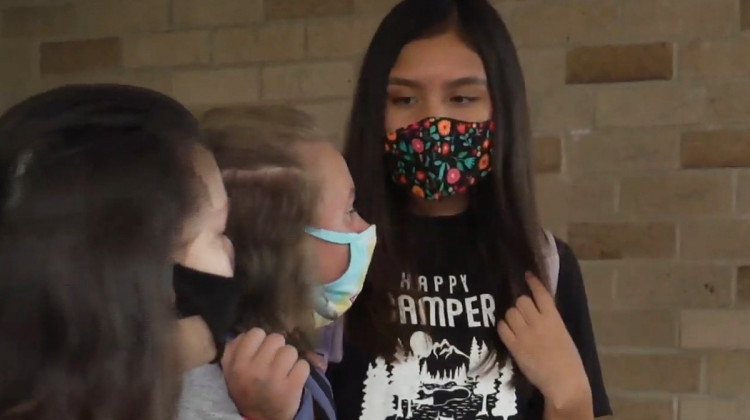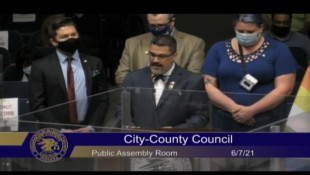
COVID-19 vaccines for kids 12 and older were approved in May. Pfizer's emergency use authorization was expanded to 5- to 11-years-olds on Nov. 2.
(Alan Mbathi/IPB News)The Food and Drug Administration and the Centers for Disease Control and Prevention approved the Pfizer-BioNTech vaccine for emergency use in kids 12 and older in mid-May. On Nov. 2, the CDC added its approval for 5- to 11-year-olds.
We asked members of the Indiana Two-Way and the Midwest Checkup for their questions and concerns about the vaccine. To join the Indiana Two-Way text “Indiana” to 73224, and to join the Midwest Checkup, text “health” to 73224.
What’s the age limit for COVID-19 vaccines?
The CDC’s Advisory Committee on Immunization Practices gave its approval for vaccines for 5- to 11-year-olds on Nov. 2, following the FDA’s approval the previous week. The Pfizer-BioNTech vaccine was approved by the FDA for emergency use May 10, and the CDC’s independent vaccine committee gave its approval the same week.
But Pfizer is currently the only COVID-19 vaccine available in the U.S. with that approval. Moderna and Johnson & Johnson are still conducting trials and the FDA is reviewing their data.
Join the conversation and sign up for the Indiana Two-Way. Text "Indiana" to 73224. Your comments and questions in response to our weekly text help us find the answers you need on COVID-19 and other statewide issues.
Aren’t kids safer from COVID-19 than adults?
They were, to a certain extent. But the delta variant took a real toll on kids, setting pediatric hospitalization records in Indiana for COVID-19.
More than half of Indiana’s COVID-19 deaths 19 and younger have occurred since July 1.
What’s the difference in the doses for kids 5-11 versus kids 12 and older?
The Pfizer-BioNTech dose for kids 5 and older would be one-third the dose for those 12 and older as well as adults.
For parents or guardians of children on the cusp of the higher dose, pediatricians recommend just getting vaccinated as quickly as possible. The smaller dose option for younger children still provides a more than 90 percent efficacy.
How do I sign my child up?
State health officials said Indiana is prepared to vaccinate this age group – and parents will be able to sign up at OurShot.IN.gov. The only vaccine available to Hoosiers younger than 18 is Pfizer-BioNTech, which are indicated by yellow markers on the state’s map.
What’s in the vaccine?
The FDA lists 10 ingredients in the Pfizer-BioNTech vaccine – mRNA, lipids ((4-hydroxybutyl)azanediyl)bis(hexane-6,1-diyl)bis(2-hexyldecanoate), 2[(polyethylene glycol)-2000]-N, N-ditetradecylacetamide, 1,2-Distearoyl-sn-glycero-3-phosphocholine, and cholesterol), potassium chloride, monobasic potassium phosphate, sodium chloride, dibasic sodium phosphate dihydrate, and sucrose.
Basically, that’s three types of fats, cholesterol, sugar, and four types of salt (including sodium chloride, which is table salt).
The Pfizer-BioNTech vaccine uses mRNA to deliver a cheat code to your body’s immune system, without giving an inactive or a live but weakened version of the virus.
What side effects do children have with the vaccine?
Pretty similar to what young adults experienced: the second dose had more noticeable side effects than the first. But those side effects were relegated to temporary pain at the injection site, fatigue, and headache. It was also common to experience chills or muscle pain. Other, less frequent side effects reported during clinical trials included fever, joint pain and nausea.
But 5- to 11-year-olds didn’t experience fever and widespread body aches as much as their older counterparts.
The CDC has some helpful guidance (and digital producer tested, the washcloth actually works) on how to help mitigate vaccine symptoms.
Important to note: fainting is also more likely with kids.
According to the CDC, fainting after a vaccine is common among adolescents. This phenomenon isn't restricted to the COVID-19 shots; it has also been observed after flu shots and the HPV and T-dap vaccines. Usually, fainting is triggered by anxiety or pain. To prepare kids for the shot, health experts recommend making sure they are well hydrated and have eaten recently, and to try to reassure them and reduce some of that anxiety.
It’s important to let vaccine administrators know if your child has a history of fainting or if they’re concerned about it. Some clinics have set up areas specifically for people who are more prone to fainting.
My child has had allergic reactions in the past to vaccinations – can they still get the COVID-19 vaccine?
If you’ve had allergic reactions to vaccines in the past, you should talk to your primary care provider about the vaccine. People who have had severe allergic reactions may need to be monitored after receiving the vaccine. Polyethylene glycol – which is in both Moderna and Pfizer-BioNTech vaccines – has been pointed to as a trigger for anaphylaxis in some vaccine recipients.
The most common allergic reaction – especially in flu shots – are in people with egg allergies. The most common flu vaccines are developed with egg-based technology, but the FDA and CDC said common food allergies and medicines shouldn’t prevent most people from receiving the COVID-19 vaccine.
What is “emergency” approval for vaccines?
The Emergency Use Authorization process essentially fast-tracks certain parts of the vaccine approval process.
University of North Carolina Health explains, "An EUA does not affect vaccine safety, because it does not impact development, such as research, clinical studies and the studying of side effects and adverse reactions. Instead, it speeds up manufacturing and administrative processes."
The COVID-19 vaccines were tested in large-scale trials with the public, which is pretty standard for vaccine testing. The Pfizer trials included 43,448 participants, and found no safety concerns to preclude use in the public.
It’s also important to note, for both Moderna and Pfizer, the mRNA vaccine technology has been researched for 30 years.
Will COVID-19 vaccines be required for school, like other vaccine schedules?
As of right now, no to COVID-19 vaccines.
All 50 states mandate childhood vaccines for public schooling – though those vaccines may differ from state to state a little bit. The federal government doesn’t really do that.
But Indiana Health Commissioner Dr. Kris Box said the state has no plans to mandate the COVID-19 vaccine for anyone, including schoolchildren.
Does the vaccine cause infertility?
Scientists haven't found evidence to support the rumor that COVID-19 vaccines cause infertility.
In early December, German epidemiologist Wolfgang Wodarg teamed up with a former Pfizer employee to petition the European Medicines Agency to delay the study and approval of the Pfizer-BioNTech vaccine. They argued, among other things, that a protein found in placenta (syncytin-1) might be so similar to one found in COVID-19 that a person's antibodies could confuse the two after receiving the vaccine, and end up attacking the protein in the placenta, resulting in infertility. The petition went viral.
But scientists say the coronavirus’s spike protein and syncytin-1 don't share enough genetic code to make them a match, so there's no reason for antibodies to attack syncytin-1. Even Wodarg, in his petition, writes “there is no indication whether antibodies against spike proteins of SARS viruses would also act like anti-Syncytin-1 antibodies.”
This story has been updated.
Contact Lauren at lchapman@wfyi.org or follow her on Twitter at @laurenechapman_. Side Effects Public Media’s Brittani Howell contributed to this report.
 DONATE
DONATE






 View More Articles
View More Articles



 Support WFYI. We can't do it without you.
Support WFYI. We can't do it without you.